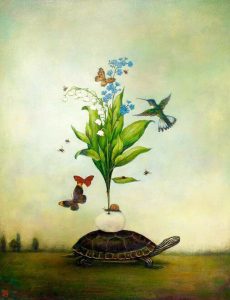 The Yogabliss, Your Heart Life on-line Moving into Meditation classes met this morning. On this beautiful Spring day we reflected on the preciousness of our time.
The Yogabliss, Your Heart Life on-line Moving into Meditation classes met this morning. On this beautiful Spring day we reflected on the preciousness of our time.
We considered what it is to wait and what it is to be. There are intentional pauses that bear all sorts of feeling and thought.
There are unadorned moments of being in which our minds can rest. All reflect the gift of consciousness that we share.
We heard Toko-Pa Turner’s poem: Waiting. The poem is from her book, Belonging, Remembering Ourselves Home. Toko-pa writes, makes art and music and works with dreams. The poem describes “good forms of waiting.”
We heard Mary Oliver’s poem, Heavy. The poem is from her 2007 collection, Thirst. The poem describes the heaviness of grief – the burden we can not or will not put down. A friend suggests we can carry this weight and live on to experience the world’s beauty annd to love.
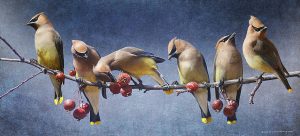 Self Reflection
Self Reflection
It is so good to be together. We are creatures that need safety. We need love and belonging. The ability to connect with each other is essential to our wellbeing – especially in difficult times. Here, the space we create together is large enough to hold the fear and grief over war’s destruction. It can hold the hope and joy for the coming of Spring and the possibility of peace. We are sitting together on the Spring equinox, the magical time when day and night are in balance with one another.
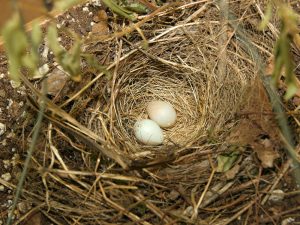 I invite you to tune into those areas where you feel supported. Let your awareness rest there for a few breaths. What is it like to attune to the sensations of support? You can explore how sensations may change or move, become stronger or begin to fade. I invite you to sense how you are relating to your experience. Can you tune in to the unadorned experience of being? Is there a sense of waiting? How is waiting different from being? If there is waiting, how and where do you feel it in your body? Is the energy of waiting followed by a story? Are you drawn back to sensations – of breath or body – at the story’s end? Can you be with your experience as a companion? Caring attention, loving awareness make being possible.
I invite you to tune into those areas where you feel supported. Let your awareness rest there for a few breaths. What is it like to attune to the sensations of support? You can explore how sensations may change or move, become stronger or begin to fade. I invite you to sense how you are relating to your experience. Can you tune in to the unadorned experience of being? Is there a sense of waiting? How is waiting different from being? If there is waiting, how and where do you feel it in your body? Is the energy of waiting followed by a story? Are you drawn back to sensations – of breath or body – at the story’s end? Can you be with your experience as a companion? Caring attention, loving awareness make being possible.
There are so many kinds of waiting: waiting for the end of illness and war; waiting for the arrival of Spring or a good friend; waiting for the fruits of meditation; waiting for this meditation to end. And there is the kind of waiting that gives us pause and the gifts of pausing. In the lengthening minutes of practice can we begin to see the many forms of waiting as something beautiful or worthwhile? We might find a simple beauty or ease in stillness.
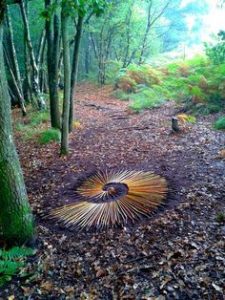 We might find solace thinking of loved ones in the past or the future. We might feel frustration or urgency in a sense of wanting. We might witness these feelings change as the mind wanders. We might experience gratitude or humility in knowing the changing nature of life. We might feel compassion for ourselves and each other.
We might find solace thinking of loved ones in the past or the future. We might feel frustration or urgency in a sense of wanting. We might witness these feelings change as the mind wanders. We might experience gratitude or humility in knowing the changing nature of life. We might feel compassion for ourselves and each other.
As poet Toko-Pa Turner writes in her Poem Waiting:
There is a good kind of waiting
which trusts the agents of fermentation.
There is a waiting
which knows that in pulling away
one can more wholly return.
There is the waiting
which prepares oneself,
which anoints and adorns
and makes oneself plump
with readiness for love’s return.
There is a good kind of waiting
which doesn’t put oneself on hold
but rather adds layers to the grandness
of one’s being worthy.
This sweet waiting
for one’s fruits to ripen
doesn’t stumble over itself
to be the first to give
but waits for the giving
to issue at its own graceful pace.
Can our practice include “This sweet waiting for one’s fruits to ripen [?] . . . [May we] . . . [wait] for the giving to issue at its own grateful pace[?]”
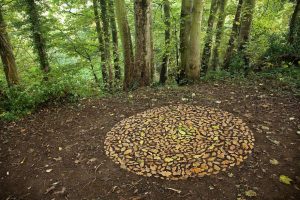 In rest, we can sense how Earth abides; how Earth supports. I invite you to tune into the subtlest sensations of entering stillness. Give yourself space and time for being, for breathing, for feeling. Can you notice how experience arises out of being? No need to put yourself on hold. Can you find a freedom in curiosity? You can allow impulses to arise. You can also allow them to ferment. Can you trust in this process of transformation? There is a good kind of waiting.
In rest, we can sense how Earth abides; how Earth supports. I invite you to tune into the subtlest sensations of entering stillness. Give yourself space and time for being, for breathing, for feeling. Can you notice how experience arises out of being? No need to put yourself on hold. Can you find a freedom in curiosity? You can allow impulses to arise. You can also allow them to ferment. Can you trust in this process of transformation? There is a good kind of waiting.
There is a difficult kind of waiting:. the waiting for help. There is the help that comes and the help that doesn’t come. Perhaps this is the kind of waiting that is answered through consolation. There are so many forms of consolation: the presence of a loved one; sharing one’s feelings; the beauty of nature; the joy in the happiness and wellbeing of others; the knowing that we are not alone.
Poet Mary Oliver describes this experience in her poem, Heavy.
 That time
That time
I thought I could not
go any closer to grief
without dying
I went closer,
and I did not die.
Surely God
had his hand in this,
as well as friends.
Still, I was bent,
and my laughter,
as the poet said,
was nowhere to be found.
Then said my friend Daniel,
(brave even among lions),
“It’s not the weight you carry
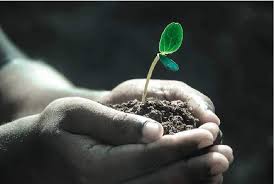 but how you carry it –
but how you carry it –
books, bricks, grief –
it’s all in the way
you embrace it, balance it, carry it
when you cannot, and would not,
put it down.”
So I went practicing.
Have you noticed?
Have you heard
the laughter
that comes, now and again,
out of my startled mouth?
 How I linger
How I linger
to admire, admire, admire
the things of this world
that are kind, and maybe
also troubled –
roses in the wind,
the sea geese on the steep
waves,
a love
to which there is no reply?
